Training
Why Train With Us?
We have the unique opportunity to provide training on the most pressing topics in the field of forensic interviewing. We team-teach our classes utilizing expert interviewers, researchers and legal professionals. FIRE conducts innovative research on-site where we learn about children’s experiences in the interview. What children tell us through research, we disseminate to you. Our research directly impacts how and what we teach. We are part of the larger Center for Hope, and LifeBridge Health system which supports our expertise in violence prevention and intervention across the lifespan.
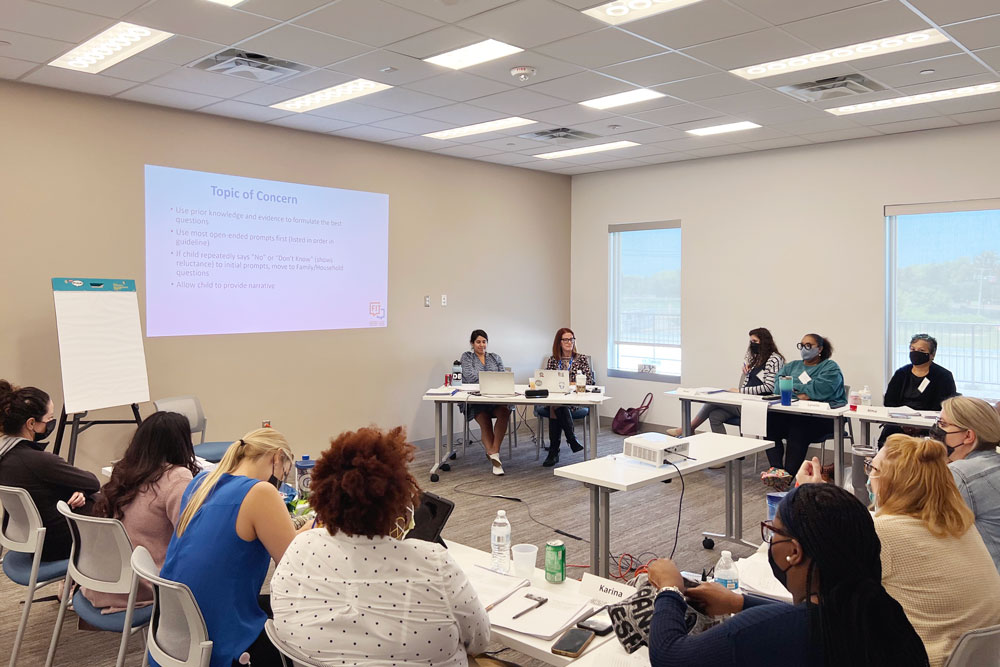
Our Facilities
CFH is a brand new, state-of-the art complex with training spaces and the latest technology, which we use for all FIRE trainings. The space lends itself to both in-person and hybrid instruction where we conduct mock interviews in real forensic interview rooms, and mock trial in a realistic courtroom setting. For tele-forensic interview training our method and tools can be experienced and practiced firsthand with our innovative video conferencing system.
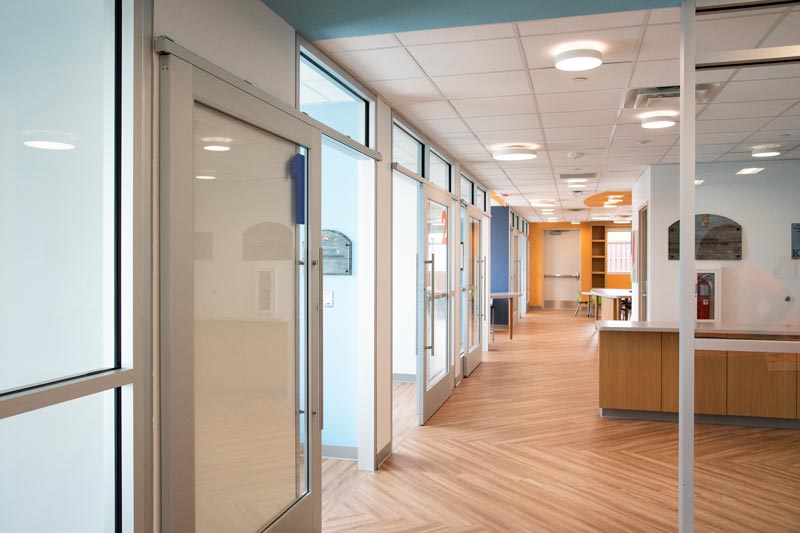
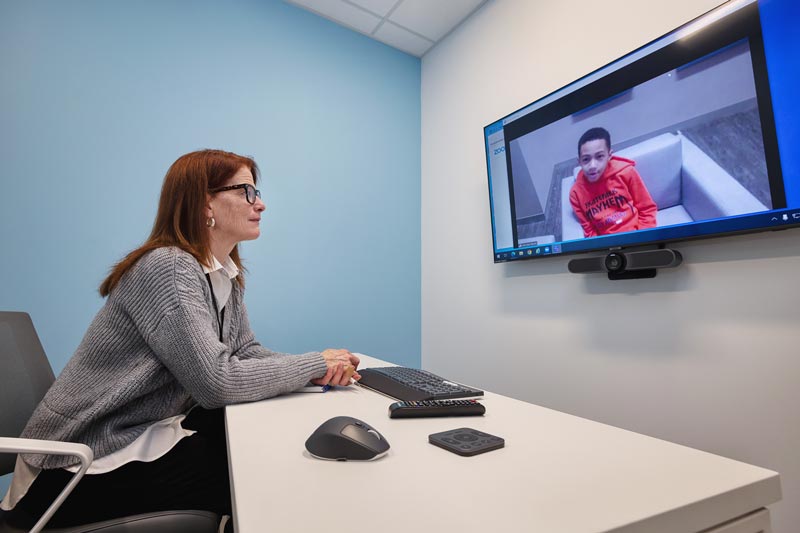
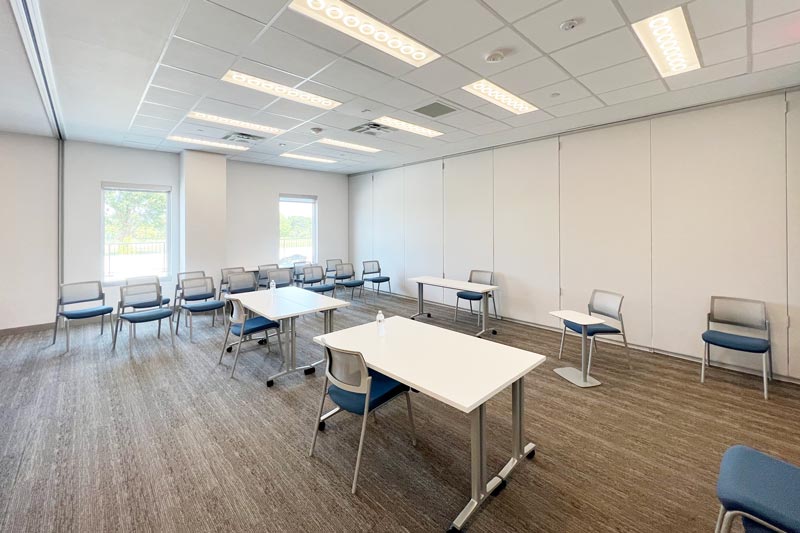
FIT Training
This NCA accredited 35-hour training includes comprehensive instruction on the Forensic Interview Toolbox (FIT), forensic interview protocol. Participants will learn best practices for questioning children and vulnerable adults (elder abuse and adults with disabilities). Practice interviews and mock trials will enhance learning along with content experts from legal, elder justice and interview research. Upon graduating from the FIT course you will have access to free annual peer review.
Topics Covered:
Current forensic interview research, question types, tele-forensic interviewing, child development, use of media/evidence, memory & suggestibility, interviewing with cultural competence, and dynamics of abuse and use of body diagrams for clarification.
Intro to FIT
Intro to FIT is a complementary presentation explaining the development of the FIT Guidelines, the benefits of utilizing the FIT Guidelines, and how they differ from other national protocols. We review how the FIT courses can benefit your agency, multi-disciplinary team (MDT) and the vulnerable populations you interview.
FIT 101
FIT 101 is a 2-day training of evidence based questioning practices with a focus on investigative, minimal facts, safety, witness, and risk of harm interviews. We will cover question types including the use of a basic semi-scripted, phased questioning approach. We review child development, practice interviews and how to conduct peer review (with special break-out for supervisors). FIT 101 is recommended for professionals who conduct interviews with children outside of the formal forensic interview. FIT 101 is not appropriate for forensic interviewers or legal professionals who rely on (or observe) forensic interviews. For these groups we recommend the full 5-Day FIT course. This training does not meet the National Children’s Alliance FI Standard.
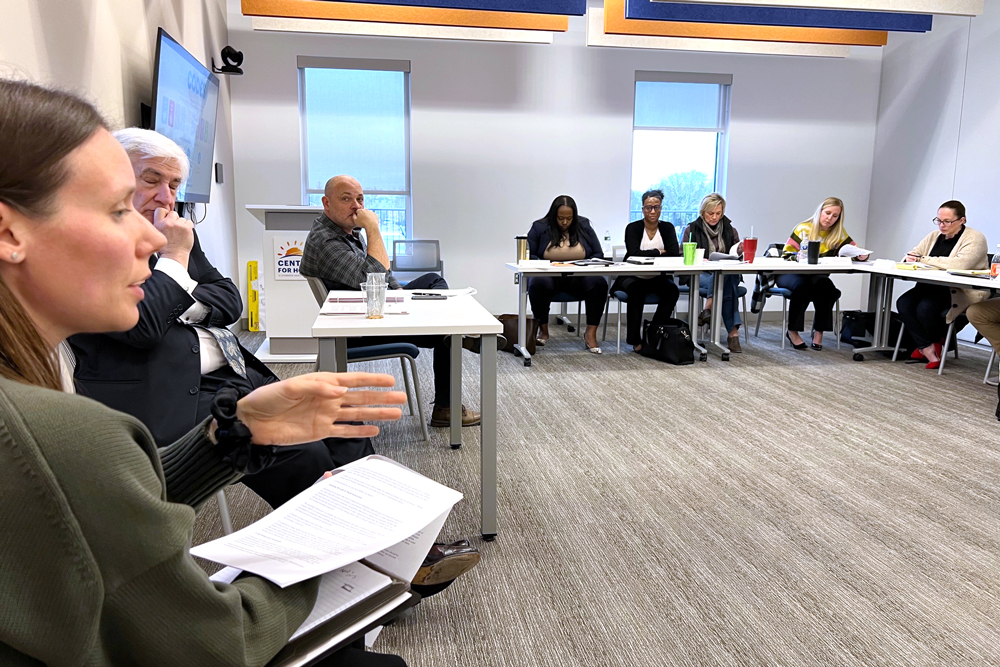
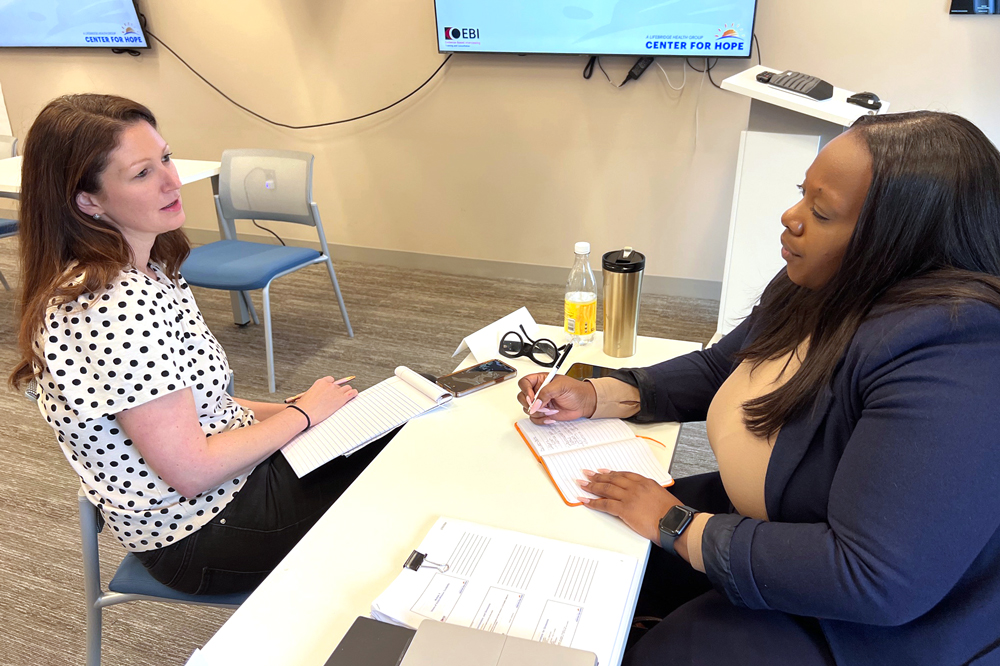
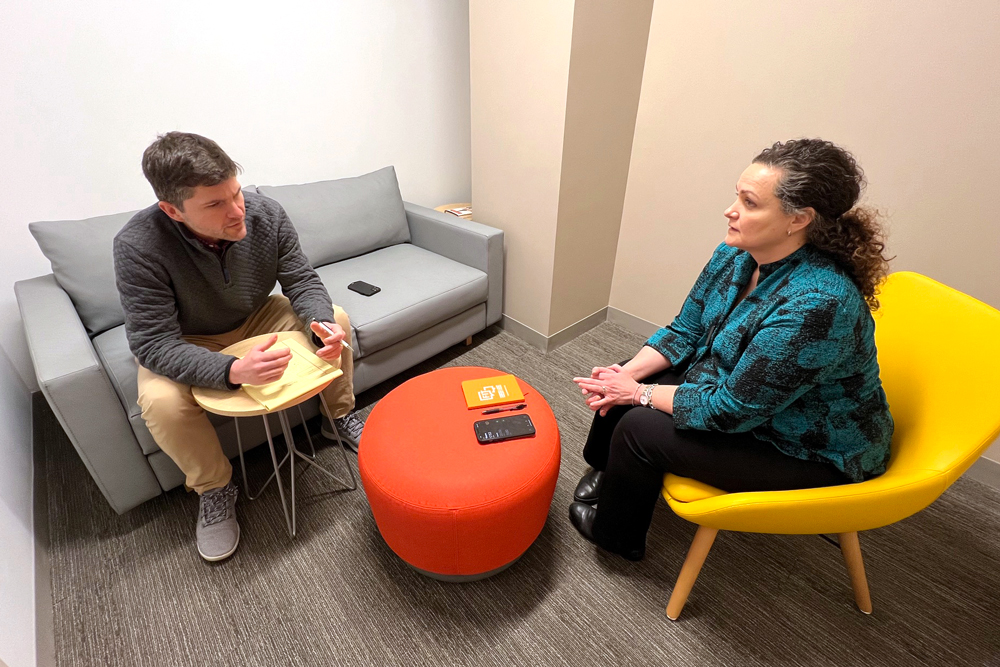
Peer Review
Another goal of FIRE is to assist forensic interviewing professionals to adhere to best practice techniques by participating in routine peer interview and literature review. This process provides participants with feedback about their practice from an expert and incorporates discussion around current updates to best practices. FIRE provides both routine peer review of recorded interviews and practice interviews conducted with actors to professionals locally and nationally.
- For FIT graduates, one peer review session is offered annually at no charge.
- Free peer review session provided annually to interviewers trained in any model
or protocol.
Enhancing Best Practices
Peer review is a critical component of forensic interviewing that ensures interviewers adhere to best practices. The 2023 Accreditation Standards from the National Children’s Alliance state: “Individuals who conduct forensic interviews must participate in a structured forensic interviewer peer review process a minimum of two times per year” (NCA, 2023). During peer review sessions, interviewers present a video or transcript of one of their forensic interviews to the group. Participants then provide constructive feedback, highlighting areas of strength and suggesting opportunities for improvement. While formal training enhances an interviewer’s knowledge, peer review transfers this knowledge into practice.
Center for Hope offers a variety of peer review opportunities tailored to meet the needs of forensic interviewers globally. These include:
Forensic Interview Toolbox (FIT) Peer Review
Focused specifically on interviews conducted using the FIT protocol. This class looks at interviews through the FIT lens. It is offered to practitioners throughout the country and internationally aimed to maintain protocol fidelity, build relationships with other practitioners using the same methods, and staying informed about the latest research updates.
Global Peer Review
Open to forensic interviewers trained in any accredited protocol. This session provides an opportunity for cross-protocol learning and feedback. We want all practitioners to have improved access to a community of support, to other interviewers, to skill building opportunities, and to review the latest research. Participants can gain exposure to various interviewing methods, allowing them to refine their skills and adapt techniques that may enhance their own practice.
Maryland Statewide Peer Review
Funded by the Maryland Children’s Alliance, this hybrid peer review experience allows forensic interviewers across the state of Maryland to convene, boost practice, and their knowledge of evidence-based methods. Free lunch with in-person networking opportunity is available through the hybrid format. The session is from 10am-3pm (hour break for lunch) with presentation of two forensic interviews and research article facilitated by experienced forensic interviewer trainers. Statewide peer review is offered multiple times per year and registration is available through the Maryland Children’s Alliance.
Each peer review session is 90 minutes in length and follows strict confidentiality guidelines. Participants are strongly encouraged to present their own interviews, as receiving direct feedback is invaluable in refining and improving interviewing skills.
Bilingual Peer Review
The Bilingual Peer Review at Center for Hope is uniquely designed for forensic interviewers conducting interviews in Spanish. Recognizing that interviewing in a bilingual context requires both linguistic accuracy and cultural sensitivity, this peer review session goes beyond standard protocol adherence. It offers a dedicated platform for bilingual interviewers to discuss challenges specific to language and culture, receive feedback, and refine techniques to ensure culturally respectful and contextually accurate interviewing practices. Bilingual peer review covers the following topics:
- Linguistic Accuracy
- Cultural Sensitivity
- Cultural Nuances in Questioning
- Working with Interpreters
- Feedback on Language Use
- Best Practices for Bilingual Interviews
Each peer review session is 90 minutes in length and follows strict confidentiality guidelines. Participants are strongly encouraged to present their own interviews, as receiving direct feedback is invaluable in refining and improving interviewing skills.
Revisión por Pares Bilingüe
La Revisión por Pares Bilingüe en el Center for Hope está diseñada de manera única para los entrevistadores forenses que realizan entrevistas en español. Reconociendo que la realización de entrevistas en un contexto bilingüe requiere tanto precisión lingüística como sensibilidad cultural, esta sesión de revisión por pares va más allá del cumplimiento estándar de los protocolos. Ofrece una plataforma dedicada donde los entrevistadores bilingües pueden discutir los desafíos específicos relacionados con el idioma y la cultura, recibir retroalimentación y perfeccionar sus técnicas para garantizar prácticas de entrevistas culturalmente respetuosas y contextualmente precisas. La revisión por pares bilingüe cubre los siguientes temas:
- Precisión Lingüística
- Sensibilidad Cultural
- Matices Culturales en las Preguntas
- Trabajo con Intérpretes
- Retroalimentación sobre el Uso del Lenguaje
- Mejores Prácticas para Entrevistas Bilingües
Cada sesión de revisión por pares tiene una duración de 90 minutos y sigue estrictas pautas de confidencialidad. Se recomienda encarecidamente que los participantes presenten sus propias entrevistas, ya que recibir retroalimentación directa es invaluable para perfeccionar y mejorar las habilidades de entrevista.
Legal Trainings
Because legally defensible practice is integral to forensic interviewing, FIRE offers a wide range of courses that help professionals prepare to confidently testify in court. Mock trials led by experts in legal and forensic interviewing lead participants through direct and cross examination exercises. The goals of the training are to build competence in explaining evidence-based practice and to learn how to respond with control and confidence in the courtroom. Individual and small group coaching is also provided by a legal and forensic interview expert team on building testimony skills.
Trial Skills for Forensic Interviewers
This intensive workshop is designed to help the child forensic interviewer develop and refine their ability to testify in court as an expert and/or lay witness. This is not protocol-specific training. There are no prerequisites required to enroll. This program is appropriate for all experience levels, but it is specifically aimed at child forensic interviewers with minimal or no experience testifying in court, as well as experienced interviewers who are uncomfortable testifying.
- Gain practical skills that will make you more comfortable and confident when testifying in court, including how to:
- Effectively prepare for court
- Testify as an expert
- Handle evidence and exhibits
- Deal with problems in the case and/or your interview
- Work with difficult attorneys
- Practice and improve your ability to defend your interview and stay in control when testifying on cross-examination.
Leaders for Social Good
Leaders for Social Good, is a grant funded peer mentoring program. This 12-month virtual program creates opportunities for leaders from diverse agencies to develop trusting relationships in small group formats. During monthly meetings, participants will be able to discuss current challenges, build self-awareness, and exchange feedback in a safe environment facilitated by a professional mentor and executive. Participants will be able to expand their network of trusted advisors while also increasing their confidence to address challenges and make informed decisions.
This program is intended for leaders from the public and private sectors with a focus on violence prevention and intervention. They represent disciplines such as child welfare, child advocacy, elder justice, special victims’ investigations, or other social enterprise organizations whose mission is to support vulnerable populations.
Forensic Interview Techniques
FIRE additionally teaches a broad range of forensic interview topics to professionals primarily in forensic contexts. FIRE uses a combination of interactive lecture, real interview examples, demonstration of technique and focused small group practice with actors. Class materials in the form of structured written guidance are provided to participants to bridge training to practice as well as guidance around how to proceed in the courtroom.
Understanding and Addressing Vicarious Trauma and Secondary Traumatic Stress
This training is designed to help participants understand vicarious trauma, identify how vicarious trauma affects us, and develop strategies to mitigate the impact of vicarious trauma.
Utilizing a mix of presentation, group discussion, and interactive activities, participants will:
- Define vicarious trauma and its relationship to direct trauma exposure.
- Identify the signs and symptoms of vicarious trauma in personal and professional contexts.
- Explore the factors that contribute to increased vulnerability.
- Develop practical coping strategies and self-care practices.
- Learn how to foster a supportive environment to address and discuss vicarious trauma within teams.
Customizable Education Programs
The FIRE team can provide a custom education program tailored to your organization’s needs. Topics may include:
- Question Types in the Forensic Interview
- Peer Review (How-To)
- Interviewing: Special Populations
- Interviewing Caregivers
- Memory & Suggestibility
- Dynamics of Sexual Abuse
- Interviewing Preschoolers
- Interview Mistakes & Moving Forward
- Culturally Competent Interviewing & the Spanish-Speaking Community
- Forensic Interview Research Updates
- and more